Israeli West Bank settlers 'sing and dance' after outpost recognised
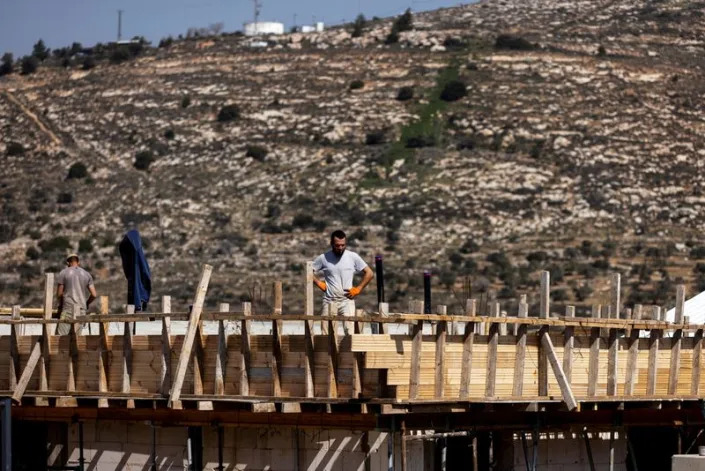
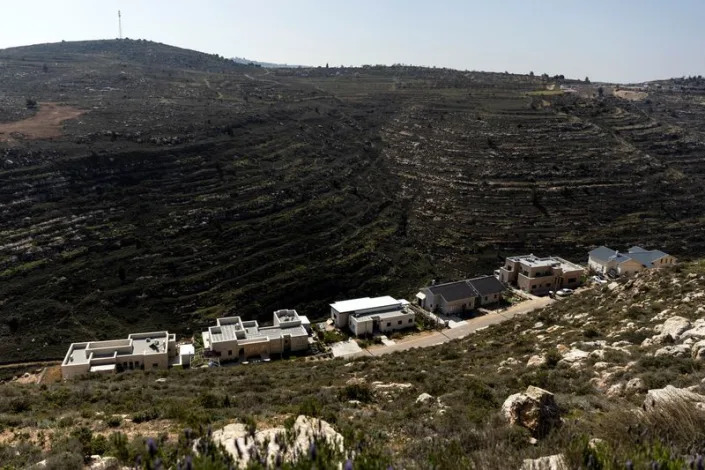
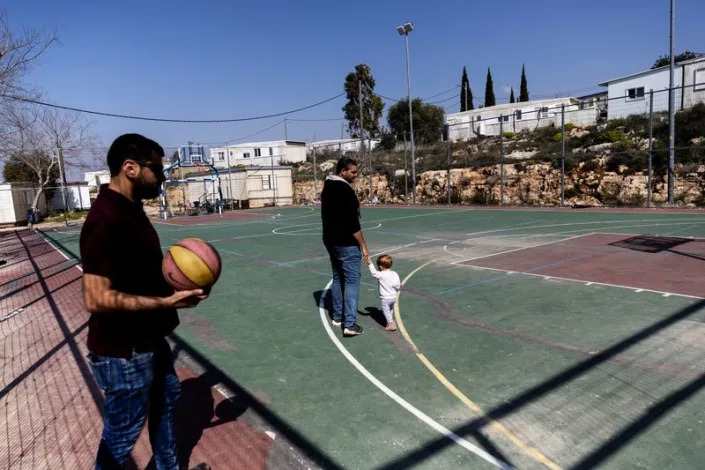
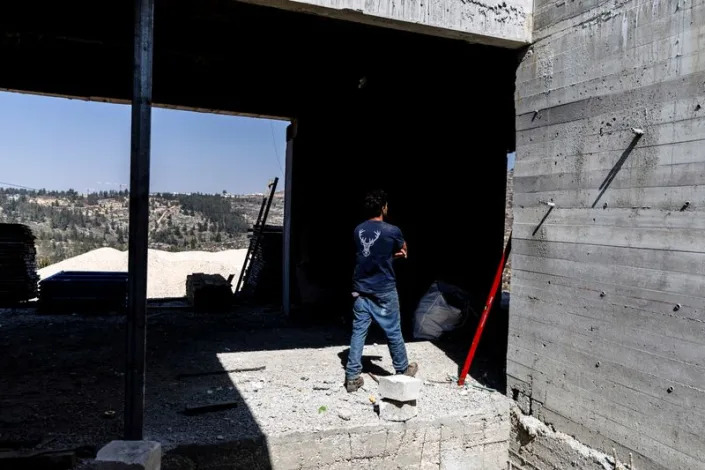
dA construction worker walks through a building site in the Jewish settlement of Givat Harel in the Israeli-occupied West Bank
Fri, February 24, 2023
By Emily Rose
JERUSALEM (Reuters) - Drama therapist Yael Drori left bustling Jerusalem 16 years ago to live in an unrecognised outpost in the Israeli occupied West Bank. As a youth, she was active in the Israeli settler movement supporting new communities in the West Bank and protesting against Israeli disengagement from Jewish communities in Gaza.
She moved to the West Bank out of ideology, but what she found was a sense of community. As the mother of a severely disabled child, she teared up explaining that her neighbours had become her "family".
Last week, Drori, 38, celebrated when the settlement of Givat Harel became one of nine to be recognised retroactively by Prime Minister Netanyahu's nationalist right-wing government.
"I thought it was something they promised but it would never happen,” she said. "It was a good surprise that made me joyful.”
Violence has surged in the West Bank in the past year with frequent clashes between the Israeli military and Palestinians. Authorisation of the settlements, which the government said was a response to Palestinian attacks, sparked U.N. denunciation.
Along with Gaza and East Jerusalem, the Palestinians seek the occupied West Bank for a state. Most world powers view settlements as illegally built on land Israel captured in a 1967 war with Arab powers.
Israel disputes that and cites biblical, historical and political links to the West Bank, as well as security interests. The first to publish the decisions by Netanyahu's security cabinet were two pro-settler politicians whose inclusion in the coalition he built after a Nov. 1 election had already signalled a hard-right tack.
In a sharp move, the U.N. Security Council issued a formal statement on Monday expressing “deep concern” about the Feb. 12 retroactive outpost recognition, saying the decision was “dangerously imperilling the viability of the two-state solution based on the 1967 lines”.
The statement was the first action the United States, with veto powers, has allowed the body to take against its ally Israel in six years.
DREAM COME TRUE
According to Peace Now, an NGO which monitors settlement expansion, 132 settlements have been established in the West Bank with another 147 outposts not considered legal under Israeli law. In recent years, settlers have erected scores of outposts without government permission. Some have been razed by police, others authorised retroactively.
While Western powers found the authorisation unsettling, residents say it simply shows Israeli policy is catching up with facts on the ground which are changing, one structure at a time.
Givat Harel, established in 1998, is now home to some 90 families. Rocky terrain peaks out between patches of grass in the majestic hills. Winding high above the green valley below, the road up to the outpost is flanked by crops and signs advertising the community’s winery.
An hour outside Jerusalem, the lack of cars on the highway leaves a void filled with clean air and the sound of chirping birds echoing between the mountains. For the residents, Israeli authorisation was nothing short of a dream come true.
“We didn’t think it would happen so quickly,” said resident Morya Tassan Michaeli. “When we suddenly realised, it was 10 or 11 o’clock at night and the excitement and elation emerged and the next day we gathered and danced and sang.”
Power outages and basic infrastructure gaps are part of life in a settlement built without government approval. Drori says she’s excited at the prospect of having an official postal address and paved sidewalks.
The streets of this community remain quiet during the day, most parents commute daily for work and high school children are often sent to boarding schools. Residents are now hopeful the recognition will lead to official bus routes, easier access and the ability to build and grow.
Palestinians say recognition and normalisation of settlements will hinder U.S. and Arab state peace efforts and lead to more tension and escalation.
'THIS IS OUR HOME'
Shirat Yulis, an architect and resident of Givat Harel, designs homes both in recognised and unrecognised communities where she says homeowners worry more about building something new. Recognition means prospective residents can take out a mortgage from a national bank.
“There’s no happier person than me today,” Yulis said. ”I know that now people can enjoy their homes.”
In another triumph for the settler movement, a far-right Israeli cabinet minister formally gained responsibilities over Jewish settlements in the West Bank on Thursday that he said included bringing their legal status closer to that of communities within Israel.
Under the new division of powers, "legislation on all (settlement) civilian matters will be brought into line with Israeli law", as opposed to being classified under the military.
Critics and human rights organisations say this normalises the status of settlements. In practice for residents, it removes the need to go through military bureaucracy on matters of infrastructure and construction.
The clashes between Palestinians and the Israeli military won’t deter residents like Michaeli. She said there had been waves of violence her entire life.
"Fear doesn’t govern our lives,” Michaeli said. "This is our life and this is our home.”
“If they approve a few more settlements, I don’t think that will change anything in the calculation or thinking of the Palestinians,” said Bracha Kaplan, a social worker who moved to Givat Harel 10 years ago.
"The question is whether one needs to ask for recognition from the outside or believe in what one is doing.
“I raise my children to believe that this is our place and we don’t have another. If this is our home and we won’t have a partner for peace, then this is what we have.”
(Reporting by Emily Rose; Editing by Nick Macfie)
FRACKQUAKE
Dutch gov't, Shell and Exxon ignored Groningen risks for years, inquiry findsFri, 24 February 2023 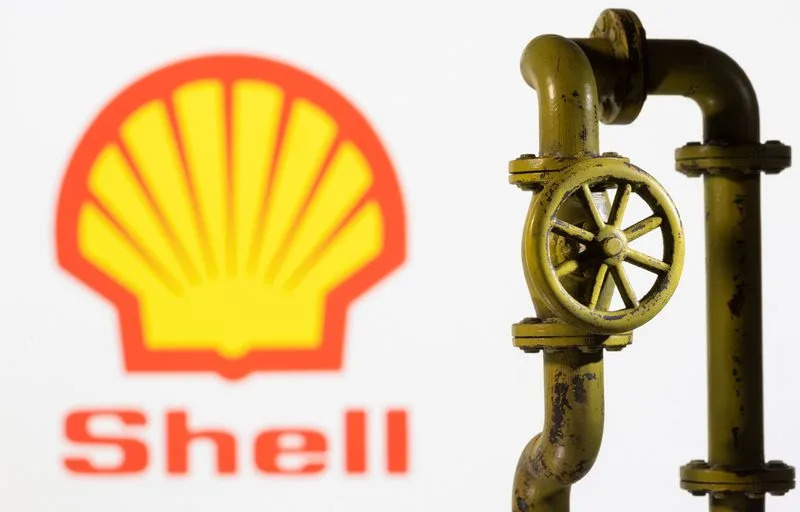 Illustration shows Shell logo and natural gas pipelineAMSTERDAM (Reuters) - The Dutch government and energy companies Shell and Exxon Mobil ignored the risks of gas production in Groningen for years, to the detriment of people living in the province, a parliamentary inquiry concluded on Friday.
Illustration shows Shell logo and natural gas pipelineAMSTERDAM (Reuters) - The Dutch government and energy companies Shell and Exxon Mobil ignored the risks of gas production in Groningen for years, to the detriment of people living in the province, a parliamentary inquiry concluded on Friday.
Prime Minister Mark Rutte and others involved "gravely underestimated" the urgency of the problems in Groningen, said the committee set up to investigate the decades of lucrative gas extraction that caused tremors damaging thousands of houses and buildings in the region.The massive Groningen field is operated by Shell and Exxon joint venture NAM and was one of Europe's major suppliers of natural gas for decades."These are hard and painful conclusions," Rutte told a news conference. "They make clear there is a lot to do to help the region and to hopefully restore trust."The government will take time provide a full response to the report, he said without indicating how long that would take.A statement from NAM director Johan Atema said: "It is clear that we need to have a better eye for the society in which we work. It is up to us to show that we as a company have learned from this."The government and NAM have previously acknowledged the seismic risks of gas production in the region and promised to compensate victims of the tremors, but they have spent years deciding how to do so.Groningen gas production has been cut back significantly over the past decade and will be halted in the coming year because of the threat to life and property from the resulting earth tremors.That realisation, however, came too late, the investigating committee said."Gas extraction in Groningen was so successful and lucrative for the Dutch government, Shell and Exxon Mobil that they hardly took any notion of the long-term risks and the ever-clearer signs of the detrimental effects for the people in Groningen," it said."The interests of the people in Groningen were structurally ignored."The committee estimated that gas profits had delivered 363 billion euros ($383.84 billion) to the Dutch treasury since production started in the 1960s, laying the foundation for the Dutch welfare state, while Shell and Exxon's profit was about 66 billion euros.The Dutch state and the oil companies must finally make good on their debt to the people of Groningen, the committee said, adding that Prime Minister Rutte had made "empty promises".($1 = 0.9457 euros)(Reporting by Bart Meijer; Editing by David Goodman)
Telecoms giant Ericsson to lay off 8,500 staff
Simon Hunt
Fri, 24 February 2023

Ericsson is to invest tens of millions of pounds in the UK over the next 10 years by establishing a new research unit to focus on 6G connectivity (Ben Birchall/PA) (PA Archive)
Telecoms giant Ericsson is to lay off 8,500 staff in a bid to slash costs.
The Swedish maker of 5G networks notified staff of the measures in an internal company memo this week, according to reports by the Reuters news agency.
The move follows a plan set out by the company last year to reduce costs by over £700 million by the end of 2023. Ericsson said the majority of the cuts would take place in the first half of 2023, but more would follow in 2024.
CEO Borje Ekholm said in a statement: “We see a potential to simplify and become more efficient throughout the company, especially when it comes to structural costs.”
Ericsson has 105,500 staff worldwide, implying a cutback of around 8% of jobs.
The firm has around 1400 staff in the UK according to its most recent annual report filed with Companies House, meaning over 100 UK workers could lose their jobs of the 8% cut is implemented in Britain.
Ekholm said in the staff memo that “the way headcount reductions will be managed will differ depending on local country practice.”
Ericsson posted sales of £586 million in the UK in 2021, a 30% jump on the previous year, while pre-tax profits climbed 48% to £16 million. However, profitability for the group as a whole took a turn in 2022, falling 27% to £1.5 billion.
The firm is one of the biggest service providers to the UK’s 4G and 5G networks. Last year, Ericsson said it planned to invest tens of millions of pounds in the UK over the next 10 years by establishing a new research unit to focus on 6G connectivity.
Global Onion Shortage Threatens a New Chapter in World Food Crisis



Agnieszka de Sousa, Souhail Karam and Maria Kolesnikova
Thu, February 23, 2023
(Bloomberg) -- Lalaine Basa would buy a kilo of onions to make spring rolls at her catering business north of Manila. She’s now changed her recipe to use half the amount because of soaring prices in the Philippines.
In the Moroccan capital Rabat, Fatima no longer buys onions and tomatoes because they are too expensive. She gets artichokes to cook tagine instead. “The market is on fire,” said the mother of three.
The experiences of the two women more than 7,500 miles (12,000 kilometers) apart shows how the global crisis over food supplies is taking an alarming twist: threatening to consume ingredients critical to the world’s nutrition.
The costs of wheat and grains have fallen in recent months, easing concern over access to some staples. But a combination of factors is now shaking up the vegetable market, the backbone of a healthy, sustainable diet. And at the sharp end of that is the humble onion.
Prices are soaring, fueling inflation and prompting countries to take action to secure supplies. Morocco and Turkey have halted some exports, as has Kazakhstan. The Philippines has ordered an investigation into cartels.
Restrictions have also gone beyond onions to include carrots, tomatoes, potatoes and apples, hampering availability worldwide, the United Nations and the World Bank warned this month. In Europe, empty shelves have forced UK supermarkets to ration purchases of some fruit and vegetables after a weak harvest in southern Spain and North Africa.
“Simply having enough calories is not good enough,” said Cindy Holleman, a senior economist at the UN’s Food and Agricultural Organization in Rome. “Diet quality is a critical link between food security and nutrition. Poor diet quality can lead to different forms of malnutrition.”
Onions are the staple of cuisines across the world, the most consumed vegetable after the tomato (technically a fruit). About 106 million metric tons are produced annually — roughly the same as carrots, turnips, chillies, peppers and garlic combined. They’re used in everything from the base flavoring of curries and soups to fried toppings on hotdogs in the US, where futures trading in them has been banned since 1958 after an attempt to corner the market.
The jump in prices is a knock-on effect from disastrous floods in Pakistan, frosts damaging stockpiles in Central Asia and Russia’s war in Ukraine. In North Africa, meanwhile, farmers have battled severe droughts and an increase in the cost of seeds and fertilizers.
Poor weather has hit Moroccan growers particularly hard. At a market in the Ocean district in central Rabat, Fatima said vegetable prices remain “exuberantly high” even with the ban on sending onions and tomatoes to West Africa introduced by the government this month.
Clutching a bag of artichokes, the 51-year-old retired government worker said her earnings no longer last until the end of the month. That financial squeeze will be felt even harder during Ramadan, when Muslims traditionally break their daily fast with a large meal before celebrating the Eid holiday.
“We are eating more lentils, white beans and fava beans and soon we will settle for rice,” said Fatima, who declined to give her full name because of the political sensitivity in Morocco surrounding food inflation.
Vegetable seller Brahim has been working in the Ocean market for over 30 years. Business has been slow, he said.
“I thought only single men bought vegetables by the piece, especially the losers,” said Brahim, 56. “Now, I bow my head when I see people who have been shopping at my stall for 10, 15, 23 years ask me in a broken voice for one tomato, one onion, one potato. People are at their limits.”
In the Philippines, a dearth of onions has compounded shortages of everything from salt to sugar over the last few months. Prices became so absurdly high that they briefly cost more than meat, while flight attendants were caught smuggling them out of the Middle East. The government of President Ferdinand Marcos Jr. has boosted imports to tame the highest inflation in 14 years.
“I just use the tiniest bits of onions,” said Basa, 58. Her almost three-decades-old business in Bulacan province caters for birthdays and weddings. “I have to adjust because I don’t want to raise prices too much and lose my customers.”
In Kazakhstan, the spike in prices has prompted authorities to tap strategic stockpiles while its trade minister urged people not to buy onions by the sack amid a panic rush to secure supplies in local supermarkets.
That’s on top of an export ban, also introduced in recent weeks by Kyrgyzstan, Uzbekistan and Tajikistan — the world’s top per-capita consumer thanks to onion-heavy national dish qurutob. Elsewhere, Azerbaijan is putting “limit” on sales and Belarus will license shipments.
As the cost of buying nutrient-rich vegetables and fruit soars and incomes struggle to keep up, healthy diets are getting out of reach. More than 3 billion people cannot afford a healthy diet, the most recent UN figures show.
Read More: Russia and China Have a Stranglehold on the World’s Food SecurityWorld’s Food Crisis Is Far From Over Despite Crop Prices Falling Food Costs Are Tumbling But Shoppers Still Face Soaring Bills The Five Hotspots Where Food Prices Are Getting People Worried
That will rise up the political agenda globally, and nutrition will be a much more prominent part of government thinking, said Tim Benton, research director in emerging risks at Chatham House in London. He calls it a “nutrition time bomb” that’s exploding slowly.
“It’s not just teetering on the edge of famine in the Horn of Africa that should worry us about the current crisis,” he said. “It's the widespread growth of poor nutrition. Nutrition was already startlingly bad on a global basis, beforehand.”
For now, while many governments will happily subsidize imports of wheat or flour to keep their people happy, there’s limited support for vegetable growers. The result is that the world produces too much starchy grains, sugar and vegetable oils than the nutritional needs, but only about a third of the fruit and vegetables needed, Benton said.
Like bread, onions also have shown the potential to ignite civil unrest. In India, which has banned exports on and off for years, high prices were cited for the Bharatiya Janata Party losing the vote in New Delhi in 1998. Two decades later, Prime Minister Narendra Modi, in his campaign to gain reelection, said farmers are his “TOP” priority, meaning the tomato, onion and potato.
“The major grains are really important from a kind of emblematic functioning of global food security and starvation,” said Benton. “But for many countries, it’s these additional things that matter when it comes to keeping the populace happy. This is in a sense the tip of the iceberg.”
--With assistance from Andreo Calonzo, Nariman Gizitdinov, Ismail Dilawar, Bryce Baschuk, Taylan Bilgic, Pratik Parija and Jeremy Diamond.
©2023 Bloomberg L.P.
UK Food shortages: Government accused of 'turning a blind eye' to empty shelves
Connor Parker
Thu, 23 February 2023
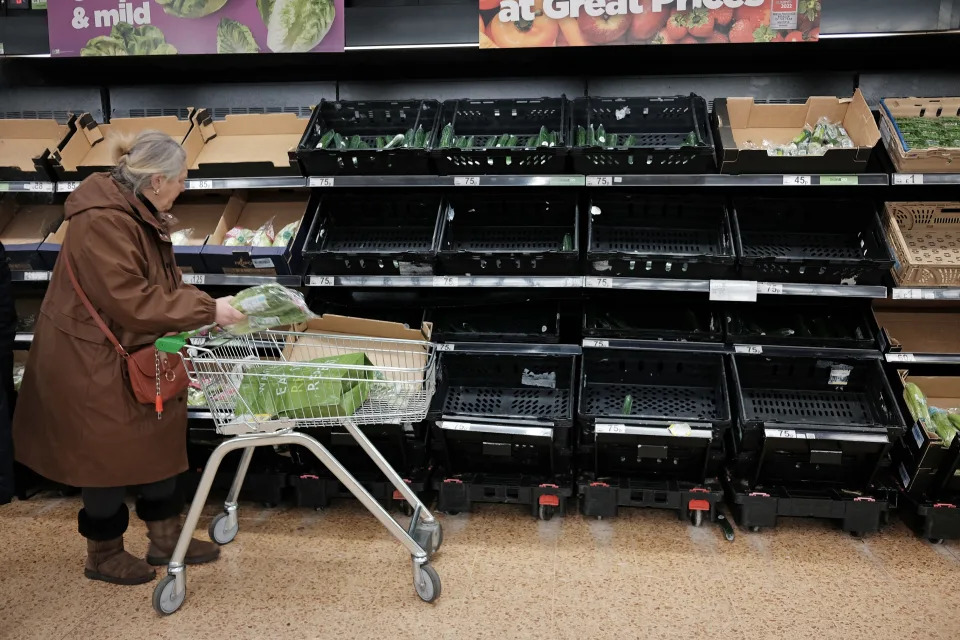
Many people have reported seeing empty fruit and vegetable shelves across the country. (PA)
The government has been accused of "turning a blind eye" to the food shortages impacting supermarkets across the UK.
In recent days several supermarket chains including Tesco and Morrisons have restricted the sale of tomatoes, cucumbers and some other fruit and vegetables.
Speaking in the House of Commons on Thursday, Liberal Democrat MP Wera Hobhouse said: "The government seems content in turning a blind eye to the urgency of the issue altogether."
She joined her party in calls for a Cobra [the government's civil contingencies committee] meeting on the issue.
Liberal Democrat spokesperson Christine Jardine said: "People are rightly alarmed about the chronic shortage of fruit and vegetables in our shops, but it seems the government has no urgent plan to fix it.
"This government has created chaos in the economy, an NHS on its knees, now they’re responsible for worsening food shortages through their failure to back British farming.
Read more: Food shortages: Fruit and veg industry 'hurt horribly by Brexit', ex-supermarket chief warns
"We need an urgent Cobra meeting, together with food experts, supermarkets and farmers, to hammer out an urgent solution to this crisis."
Environment secretary Therese Coffey defended the government in the Commons, and said she had been informed by industry experts that it was a temporary issue that should be resolved in two to four weeks.
Coffey blamed the unseasonal weather in Spain and north Africa, where much of Europe's tomatoes are grown over winter, for the crisis.
Responding to an urgent question, Coffey said: "I am led to believe by my officials, after discussion with industry and retailers, we anticipate the situation will last about another two to four weeks."
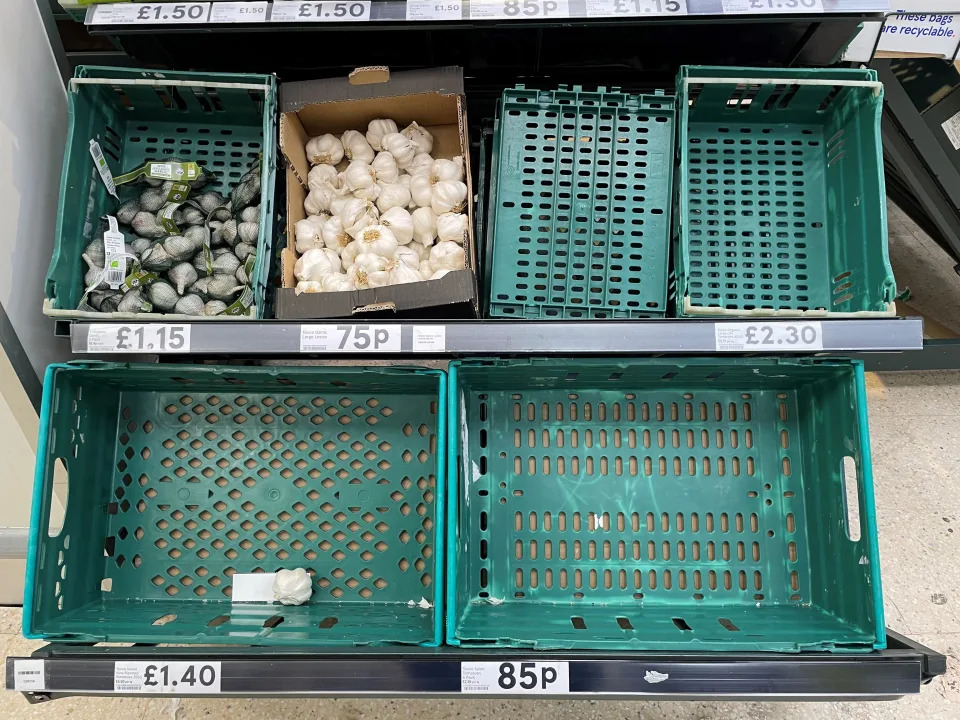
Empty tomato trays at a Tesco Express. (PA)
Coffey said other European countries had been facing similar issues, but MPs in the Commons contested this.
SNP MP Amy Callaghan said: "There are no reported shortages of food in France, Germany and other European net-food importers.
"Isn’t this a problem created by inward-looking little England, and this British government?"
Coexphal, an association of Spanish fruit and vegetable companies, told the Guardian tomato production was down 22% year on year, with cucumber production down 21%.

Therese Coffey said on Thursday she believed the food shortages would be a temporary issue. (PA)
They said a recent cold snap, along with higher production costs and viruses had impacted production.
But other farmers have said they have not seen a decline in production and said the UK's issues were more to do with logistics and transport than a lack of supply.
A representative of another Spanish farming association, Asaja, told the paper: "Things are normal so far this season so I don’t know if it’s more a problem of UK logistics since the Brexit regulations came into effect.
"There’s enough produce to supply the market and the vegetable season is happening pretty normally.”
Some analysts based in the UK have pointed to Brexit as the problem, with images shared on social media showing supermarkets on the content full of fresh produce.
The BBC reported that Ireland, which is in the EU, is also having problems.
Rationing is back because we failed to learn the lessons of Covid
Ben MarlowTHE TELEGRAPH
Thu, February 23, 2023
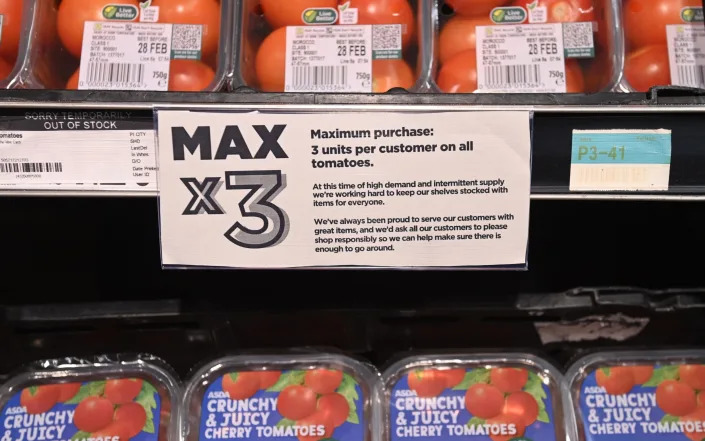
UK supermarkets have introduced limits on fruit and veg amid a supply shortage - NEIL HALL/EPA-EFE/Shutterstock
For Theresa May it was Brexit, while partygate finished Boris Johnson, and Liz Truss was undone by a spectacular revolt in the bond markets. Rishi Sunak may one day look back at this week's National Farmers' Union conference in Birmingham as the moment when it became clear that the Tories’ time in charge was well and truly over.
The two-day jamboree had got off to a wobbly start for the Government, with farming minister Mark Spencer facing tough questions. Sunak himself hardly helped with a brief appearance by video link where he laughably claimed that his participation in “the early morning milking in Wensleydale” had left him with a greater empathy for the plight of Britain’s farmers.
But it was the entrance of Thérèse Coffey's refusal to accept that the Government was in any way to blame for the current food shortages that left the audience understandably seething. There may be fewer raspberries to go around at the minute, but this was the Environment Secretary blowing a big one back at angry farmers. “We can’t control the weather in Spain,” Coffey declared, perhaps half-wishing she could be magically teleported there, away from audible boos.
The NFU’s main gripe is that if vegetable growers hadn’t been excluded from the Government’s energy support programme then the sprawling greenhouses of Kent wouldn’t have been left half-empty and we wouldn’t have seen a return to supermarket rationing. Coffey blames the Spanish climate.
There may be some truth to that, though images of fully stocked greengrocers on the continent suggest otherwise. But a more astute politician would have acknowledged that more could be done to help instead of seeking to deflect blame with glib remarks about the weather. Fierce criticism from former Sainsbury’s boss Justin King won’t have helped her case.
Yet there is a much bigger problem, which is that national resilience has disappeared from the political agenda again when in fact it should have been front and centre of government policy the second the pandemic erupted.
The Covid outbreak was quick to expose numerous weaknesses in Britain’s self-sufficiency. Though the national vaccine programme was a stunning success in many ways, the NHS was only really able to rely on the homegrown Oxford-AstraZeneca jab at the beginning. As the vaccine effort ramped up, additional supplies were needed from India, and it was soon clear that a widely threatened European blockade risked the delivery of second doses of the Pfizer jab.
Then as the world emerged from lockdown, our reliance on overseas partners was laid bare again as demand for precious materials and microchips outstripped stocks. The ensuing supply shock led to acute shortages of popular consumer goods, essential components, and vital raw materials, and the consequences of this resulting ruinous new inflationary era are still being felt by families on almost every front despite the efforts of central bankers.
The war in Ukraine served as another serious warning, this time of our over-dependence on energy supplies, and not just from unreliable foreign despots but allies closer to home too. Amid all the focus on Putin’s weaponisation of Russian oil and gas, it is easy to forget that France threatened to shut down Jersey’s power supply in response to a row over post-Brexit fishing rights.
But it was the emergence of big gaps on supermarket shelves within weeks of the pandemic erupting that should have prompted a national effort to bolster resilience. The creation of the Covid Recovery Commission, led by Tesco chairman John Allan, was the right idea. From the rubble of the coronavirus, there was a huge opportunity for a reinvention that made us less vulnerable to complex yet fragile global supply chains and the whims of unstable regimes.
But much like Brexit, it was squandered, perhaps because the Government has decided that such a move is incompatible with the free market principles it espouses outside of the European Union. Yet as Allan pointed out, the merits or otherwise of globalisation aren't the issue - shortages are becoming more acute and they demand a proper response from Westminster. Besides, it is perfectly possible to diversify the supply chain at the same time as offering protection and support for UK farmers.
We are far too reliant on a small number of exporters. In the winter months the UK gets around 95pc of its tomatoes and 90pc of its lettuces, most from Spain and north Africa. The 90-hectare Thanet Earth project, which produces 450m salad vegetables a year, is impressive but Britain could probably do with many more industrial agriculture complexes like it.
Meanwhile, there are millions of other farmers toiling away in the fields who say they have been left distinctly poorer by the end of EU subsidies, as well as the spiralling costs of energy, fuel, fertiliser and animal feed, which has prevented them from growing more. Excluding vegetable producers from the energy support scheme now looks like an act of stupidity but farmers have been warning for months that the UK is “sleepwalking” into a food crisis.
The failure to learn the lessons of Covid and take food security more seriously is now coming back to bite the Government in such a big way that the Prime Minister effectively stands accused of stealing the nation’s cucumbers.
Farmers are supposed to be “true blues”. If the Tories lose the support of the countryside, they can kiss goodbye to the next election.
Apples and pears could be next UK food shortage, farmers warn
Sarah Butler
Fri, 24 February 2023
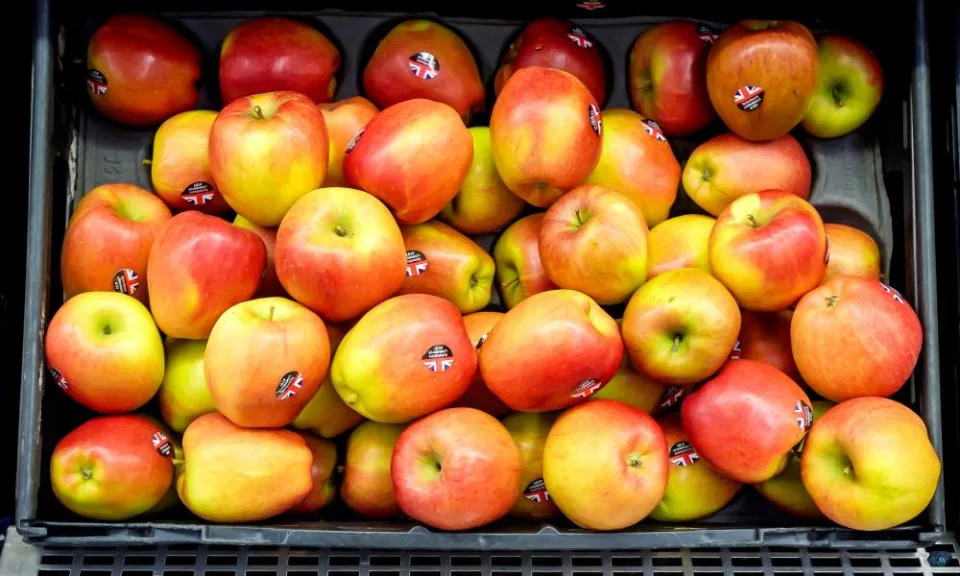
Photograph: Peter Jordan_F/Alamy
Apples and pears could be the next food shortage in the UK, after it emerged that British growers are planting just a third of the number of trees needed to maintain orchards, saying their returns from selling to supermarkets are unsustainable.
Ali Capper, head of the British Apples & Pears trade association which represents about 80% of the industry in the UK, said 1m new trees would have to be planted each year to maintain the UK’s 5,500 hectares (13,590 acres) of production.
This year farmers had planned to order just 480,000 apple and pear trees but that has been slashed to 330,000. Capper said the key reason for the lack of investment was “supermarket returns that are unsustainable”.
Related: Why are UK supermarkets facing fresh food shortages?
She said fruit growers’ costs had increased by about 23% as the cost of picking, energy, haulage and packaging had risen but that was being met by a less than 1% increase in returns. “The majority of growers are losing money.”
Some are planning to quit the industry and others have effectively mothballed their orchards or are grubbing them up as the returns dwindle. “This is a very serious situation,” said Capper. “The future of apple and pear growing in the UK is seriously in doubt.”
Britain is already facing shortages of multiple fresh food items, prompting Tesco, Asda, Aldi and Morrisons this week to limit purchases of certain lines including tomatoes, cucumbers and peppers.
The shortages have been triggered by cold weather in Spain and North Africa hitting crops there and by big cutbacks by British and Dutch growers, who plant salads under glass at this time of year, as growers say supermarkets were not prepared to cover the increased cost of heating.
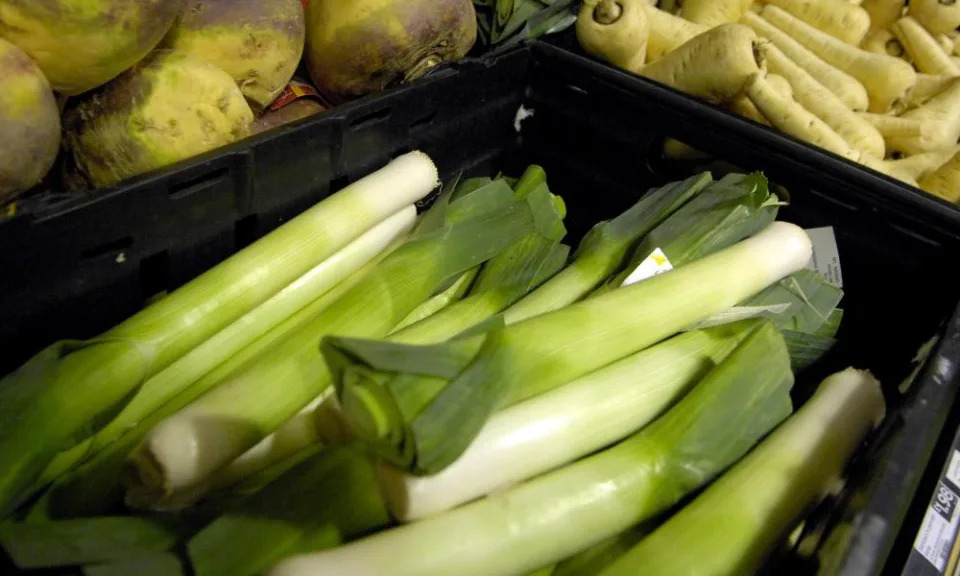
Leeks, parsnips and swedes. Growers are warning of a leek shortage by March. Photograph: Clive Gee/PA
Some importers say Brexit has also meant the UK is at the back of the queue behind the EU when competing to buy scarce fresh produce, because of the increased costs and bureaucracy associated with shipments over the channel.
It comes as nearly a fifth (18%) of UK adults said they had experienced shortages of essential food items in the past two weeks, according to the Office for National Statistics, up from 13% a year ago, as food importers say Britain’s exit from the EU continues to mean higher costs and potential holdups because of extra bureaucracy.
Thérèse Coffey, the environment minister, said on Thursday she expected the shortages of some fresh food items to last for up to a month, but some British growers say the shortages could last until May.
Coffey suggested in the same session in parliament that British households might “cherish” British turnips instead of unseasonal crops from abroad. By Friday morning, however, Tesco’s website had sold out of turnips, offering shoppers the option of a swede instead.
British field crops including leeks, carrots and kale have also been affected by frosts before Christmas that reduced harvests this year as farmers struggle with rising costs and volatile weather partly caused by climate change.
Tim Casey, the chairman of the Leek Growers’ Association, said that British leeks might be difficult to find for St David’s Day this year. “Leek farmers are facing their most difficult season ever due to the challenging weather conditions,” he said.
“Our members are seeing yields down by between 15% and 30%. We are predicting that the supply of homegrown leeks will be exhausted by April, with no British leeks available in the shops during May and June, with consumers having to rely on imported crops.”
Clive Baxter, whose family has been growing apples for 80 years in Kent, said he planned to hand back 24 hectares (60 acres) of apples, pears, cherries and plums on leasehold land to his landlord next year – meaning the trees were likely to be grubbed up – and was leaving another 3.6 hectares (nine acres) of his own orchards to go fallow.
“We haven’t seen quite such dramatic change to the fruit industry in this country since the 1987 hurricane when a huge amount of fruit came out of the ground because of the damage from the storm,” he said.
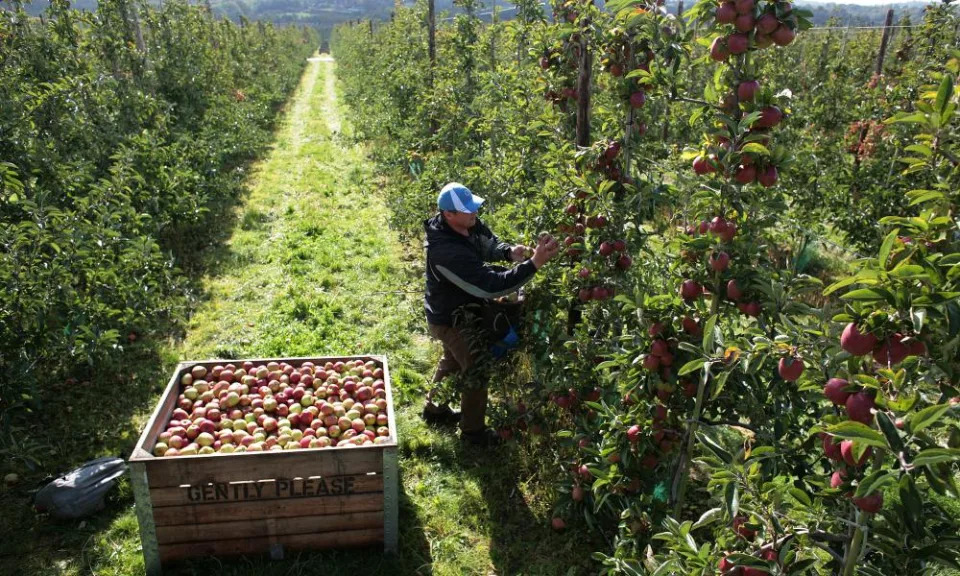
An apple farm in Kent. Growers say they plan to plant just 330,000 new trees this year rather than the 1m needed to maintain production. Photograph: Martin Godwin/The Guardian
Baxter has diversified into vineyards as the price is more protected as supermarkets are offering him less money for his apples and pears while costs have risen, largely thanks to soaring fertiliser, energy and labour costs after. Brexit which slowed the flow of workers from Europe. “We are already losing money,” he said.
Nearby farmer Richard Budd at Stevens Farm in Hawkhurst told the BBC’s South East news programme that he is taking out 20 hectares (50 acres) of orchards.
Another farmer told the British Growers Association survey of British Apples & Pears growers: “We have decided to quit apple growing in two years’ time after 40 years of growing fruit.”
Capper said if fruit trees disappeared it would not only put food security at risk but affect biodiversity which had been fostered in many orchards.
Leeks next veg to be rationed as growers warn British stocks will run out
Chris Price
Fri, February 24, 2023
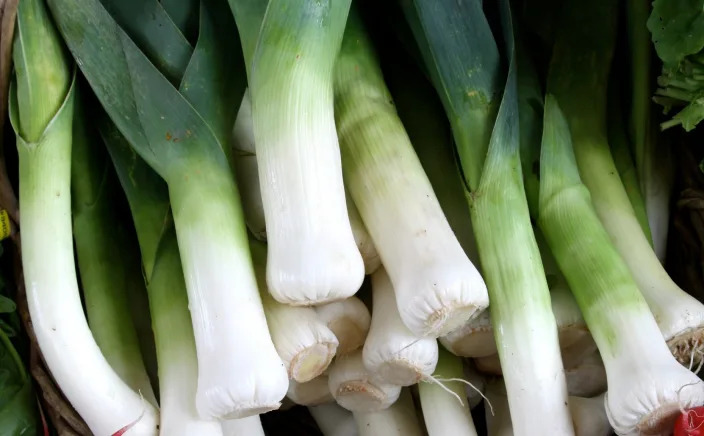
Supplies of leeks could run out by April, growers have warned
Leeks could become the latest vegetables to be rationed after a turgid growing season, growers have warned.
Leek growers have suffered amid high temperatures and low rainfall - meaning supplies could run out by April.
Tim Casey, chairman of the Leek Growers Association, said: "Leek farmers are facing their most difficult season ever due to the challenging weather conditions.
"Our members are seeing yields down by between 15pc and 30pc.
"We are predicting that the supply of homegrown leeks will be exhausted by April, with no British leeks available in the shops during May and June, with consumers having to rely on imported crops."
It comes as Tesco and Aldi have been rationing supplies of tomatoes, peppers and cucumbers this week amid a shortage of supply linked to bad weather in Morocco and Spain.
Asda has also put limits on the sale of lettuce, salad bags, broccoli, cauliflower and raspberries, while Morrisons is also limiting sales of lettuce.
The National Farmers Union warned late last year that Britain could be "sleepwalking" into a food security crisis after many farmers scaled back production in 2022 as costs for energy, feed and fertiliser soared.
Environment Secretary Therese Coffey suggested on Thursday that British consumers should eat more turnips instead of imported food.
BASF to cut 2,600 jobs as energy crisis puts Germany on track for recession
Jasper Jolly
Fri, 24 February 2023
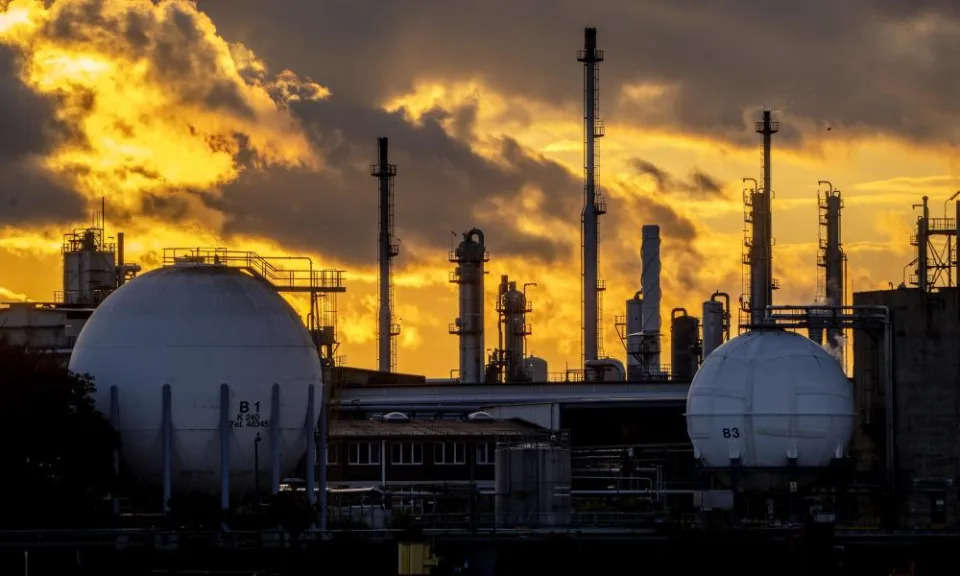
Photograph: Michael Probst/AP
The German chemicals company BASF has said it will cut 2,600 jobs as Europe’s largest economy braces for recession triggered by the energy crisis that intensified after Russia’s full-scale invasion of Ukraine a year ago.
The year was “dominated by the consequences of the war in Ukraine and in particular by increased raw material and energy prices”, BASF said in a statement on Friday. It paid additional energy costs of €3.2bn (£2.8bn) globally during 2022.
BASF is the world’s largest chemicals group and one of the mainstays of German industry, with 157 years at its Ludwigshafen site on the river Rhine near Frankfurt. It produces chemicals used to make countless products across the world, ranging from fertilisers to plastics, cars and pharmaceuticals.
Related: Leaders of German left condemn ‘peace rally’ over far-right involvement
However, it has been particularly affected by its dependence on gas piped from Russia, and has previously announced a €7.3bn writedown on plants in Russia that have been expropriated. It said it will close one of two ammonia plants, and two plants for plastic chemicals, as well as shift some production away from Germany.
The invasion of Ukraine, which started on 24 February 2022, prompted a scramble for European industry to find alternative sources of energy, after decades of reliance particularly on Russian gas. Energy prices surged as a consequence.
Germany’s economy has faltered because of the crisis. German GDP fell by 0.4% in the final three months of 2022, according to data published on Friday by the country’s Federal Statistics Office. “Continuing large price increases and the ongoing energy crisis had a negative effect on the German economy towards the end of the year,” the office said.
BASF made a net loss of €627m in 2022, as demand for its products dropped and materials prices increased. Some of the blow was cushioned by higher prices to reflect the increased costs it was bearing, so overall sales grew by 11% to €87.3bn.
The company said: “The high level of uncertainty that arose over the course of 2022 due to the war in Ukraine, high raw materials and energy costs in Europe, rising prices and interest rates, inflation and the development of the coronavirus pandemic will continue in 2023. All of these factors will negatively impact global demand.”
“Europe’s competitiveness is increasingly suffering from overregulation, slow and bureaucratic permitting processes, and in particular, high costs for most production input factors,” said Martin Brudermüller, the BASF chief executive.
“All this has already hampered market growth in Europe in comparison with other regions. High energy prices are now putting an additional burden on profitability and competitiveness in Europe.”
Brudermüller in April 2022 suggested that moving from Russian gas could “destroy our entire economy”. “It is a fact that Russian gas supplies have so far been the basis for our industry’s competitiveness,” he said, in an interview with the Frankfurter Allgemeine Zeitung.
Worst-ever February rainforest data for Brazilian Amazon
Fri, 24 February 2023
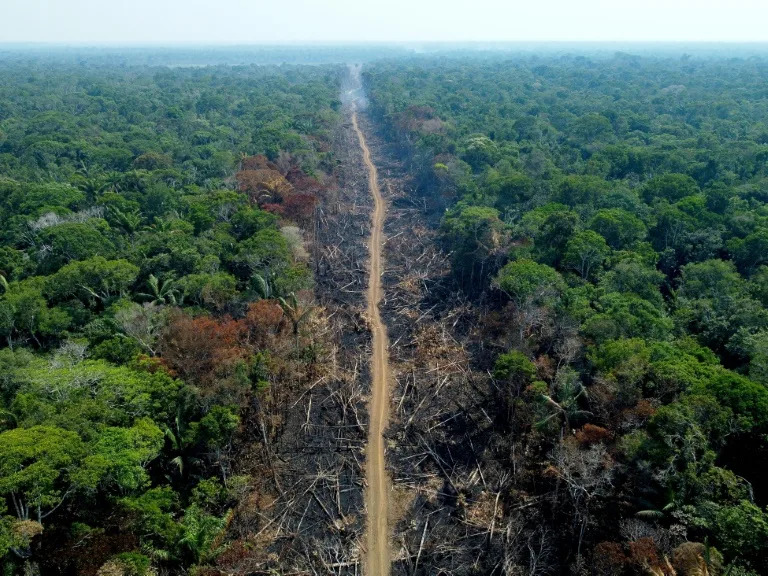
Brazilian Amazon deforestation reached its worst-ever February level in the second month of President Luiz Inacio Lula da Silva's presidential term, provisional data showed Friday.
Surveillance satellites had detected 209 square kilometers (80.6 square miles) of forest destroyed,, according to the INPE space research institute's DETER monitoring system.
This is an area equivalent to about 30,000 football fields.
The INPE report included data only up to February 17, but was already an increase from the previous worst February, in 2022, when far-right leader Jair Bolsonaro was still in office.
Last month, Amazon deforestation was down 61 percent from a year earlier, according to the same source.
But experts warned at the time it was premature to talk of a "reversal" of the deforestation trend, partly because some forest loss may have been unobserved due to heavy cloud cover.
The February increase may partly reflect forest losses that were unobserved in January, WWF Brazil expert Daniel Silva told AFP.
Over Bolsonaro's presidency, average annual deforestation increased by 75 percent compared to the previous decade.
Bolsonaro instigated policies that favored the agriculture and logging industries mostly responsible for deforestation.
Having previously governed Brazil from 2003-10, Lula took office on January 1 this year with a promise to rebuild the government agencies tasked with protecting the environment after severe budget and personnel cuts inflicted on them by Bolsonaro.
He has also announced an ambitious goal of zero deforestation by 2030.
In order to do so he is counting on international aid, notably through the Amazon Fund, to which Germany and Norway are the main contributors.
WAR CRIMEPalestinian nurse spots own father among dying casualties from Israel raid
Imad SAADA
Fri, 24 February 2023

When Israel conducted its deadliest raid in the occupied West Bank in almost two decades this week, a young Palestinian nurse rushed to help.
As critical case after critical case succumbed to their wounds, Elias al-Ashqar, 25, let out a blood-curdling roar.
"My father! My father," he screamed, as he realised his dad was among the 11 people killed in the raid on the flashpoint city of Nablus.
"I was on my regular shift in the hospital on Wednesday morning. I was busy with a group of medical students from An-Najah University," Ashqar told AFP.
It was then that the emergency department alarm bell sounded, warning of multiple incoming casualties, an increasingly frequent occurrence amid the growing violence of recent months.
As he entered, he saw two people on opposite beds. "The doctors were trying to resuscitate them," he told AFP, tears welling in his eyes.
"I helped the doctors with the first patient. He was young but soon died, so I tried to help save the life of the second man without looking at his face.
"The doctors were trying to resuscitate him, so I left them to help other cases... but I had a strange feeling the second wounded man belonged to me.
"I ran back and asked about him, and they told me that he had been martyred, so I subconsciously pulled back the curtain, and discovered that the martyr was my father."
Ashqar said his father Abdel Aziz, 65, had been returning from prayers in the Old City when he was caught up in the Israeli incursion. He said his father was unarmed.
Recent clashes in Nablus are at least partly the result of the emergence of a new militant group in the city dubbed the Lions' Den, that claims to rise above traditional factional loyalties and has been blamed for a number of attacks on Israeli targets.
Israel said Wednesday's raid targeted two Lions' Den members, as well as a member of the Islamic Jihad militant group.
As young men lined up to offer their condolences on Friday, Ashqar said his father had simply been going about his everyday life and lamented the prospects of ever winning justice for him.
"I don't know whether the Palestinian person is different to the European or American person," he said.
"We just wish we could have a life, we just want a life."
str-gb/kir
Ukraine issue Banksy postage stamp on first anniversary of war
Fri, 24 February 2023
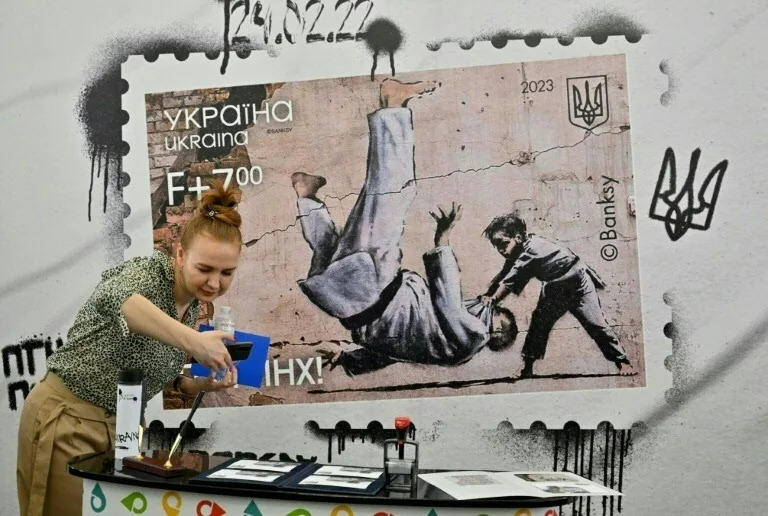
Ukraine on Friday issued a postage stamp reproducing a mural by British street artist Banksy showing a boy defeating a grown man in judo, to mark the first anniversary of Russia's invasion.
It was painted by Banksy on a demolished wall in the town of Borodianka, northwest of Kyiv, where many buildings were reduced to rubble by Russian aircraft at the start of the invasion, which began a year ago to the day.
The image draws inspiration from Russian President Vladimir Putin, known to be a black belt in judo, and depicts a young judoka representing Ukraine knocking down a grown man.
The phrase "Get lost Putin" has been added to the lower left part of the new stamp, which reproduces the stencil.
A number of Banksy drawings also appeared in Kyiv at the end of 2022.
Residents of the capital flocked to buy the new stamps on Friday, from the main post office on Kyiv's central square, the Maidan.
Among the queuers, Svetlana, a 50-year-old economist, was keen to get her hands on one "because I support the Ukrainian armed forces" and "the stamp is printed at a historic moment", one year after the start, on February 24, 2022, of the Russian invasion.
Also buying the first-day issue, Maxime said she was delighted to see a "first stamp from one of Banksy's works".
"It's a very cool gesture for the world to understand Ukraine, that we remain in the spotlight," the 26-year-old told AFP.
epe/tbm/bds/ea/pvh





.png)









.jpg)



